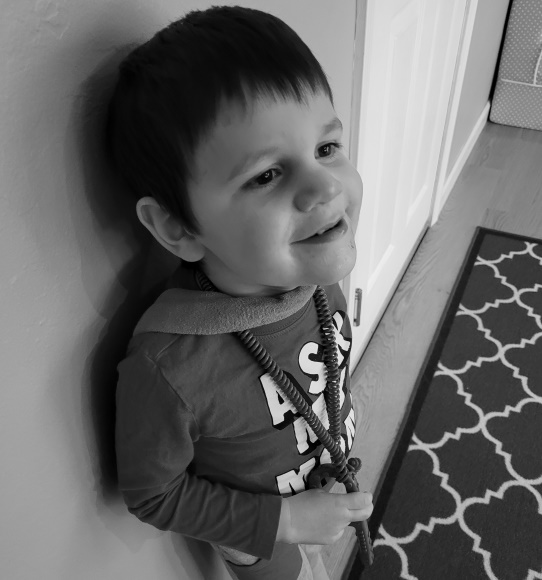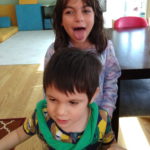
“What did you do?” It is often asked in one form or another when people find out my son bites, kicks, and hurts, it most cases, me. See, people assume that I must have upset my son. After all, why would he hurt me? But the reality is, I am fortunate because I realized I was doing nothing wrong. Let me go into my exact thought process.
At first, I thought it was my fault. That my son was trying to communicate with me things such as being tired or hungry, originally the biting seemed to correlate with a tired child, so obviously, I would make this connection. But if you know anything about correlations, they aren’t always causation. That is why social science is such a fine and frustrating science because it takes time and lots of data. If you want to prove a hypothesis correct – My child bites me because he is tired – then you have to keep track of every instance of being bitten. Still, you also need to find a large sample size of people with the same situation if you want to make the blanket statement, “all tired cognitively impaired children who are trying to communicate without the means will bite.”
[…] there have been devastating weeks of scars physically and mentally for me.
Since most of us aren’t trying to write a medical paper or our thesis to complete our doctorate, we tend to focus on our situations but then reach out for help from others if their conditions are similar enough to ours. Which is how I got to this topic. On Facebook a parent was reaching out for help about their child only seeming to be violent at home, and to their immediate family. They wanted to know ways to help.
But when you are part of this “social experience” or just my life, at times, it’s easy to be skewed into thinking if you make changes, you can fix this issue.
What does that mean? For some of us, I argue, there is nothing we can do to change this without the person who is impaired making a cognitive breakthrough or change which impacts this behavior.
As the weeks, months, and years have gone by, there have been devastating weeks of scars physically and mentally for me. There have been amazing weeks of not one bite, one kick, one reason to think my son could hurt me. Then out of the blue, while giving me a hug, cooing, and pulling me closer because he doesn’t want it to end, he bites me. He wasn’t tired. He wasn’t hungry, and he wasn’t upset – to be fair, my son is rarely, if ever upset.
I can’t control the misfirings of his brain.
So I would love to say that I was conducting research, collecting all the data, and writing out my thesis on why cognitively impaired children hurt their parents to help bring some validity to my findings. Still, the reality was, I was on Facebook responding to a parent who insinuated that there were changes that this parent could make to themselves.
I want to share my response, …not every child has a trigger. People would say to me, “what did you do to upset him?” and I would feel like it was my fault, but it wasn’t, and it’s not. I can’t control the misfirings of his brain. So, in many cases, it’s not that we are the cause. If anything, it’s because they relax and are comfortable around us that these things happen. Think about it like this, when you get upset, you can keep it all bottled in, but when the person you trust and love the most is there – for children they see their mom maybe – they burst into tears, unable to contain themselves because they feel safe. I think we assume we did something wrong (when there is violence from our child). I want to point out, it could be because we do something right.
Now the reality is, like all research, this is a theory, which I have a sample of one for – my son. But coming to this realization after I saw the comment asking how that parent was possibly “triggering” their child, it was as if a bolt of lightning hit me. It’s wrong that we can be blamed, even if it’s not directly or with malice.
My son shows us the most simple things.
I am the most loving parent to my son. I do nothing but care for him, love him, and fight for him. He doesn’t have a “bad bone” in his body, but he does have impulses he can’t control. Biting is one of them. Kicking is another. He laughs with glee, not because he is kicking me in the face, but because he’s so happy to be around me. I tend to say to people he is very genuine because you can’t make him do anything. So if he hugs you, it’s because he wants to, walks away, it’s because he wants to. But you could also say he is very primal. He is all instinct: the good and the bad.
Now, I almost immediately hear a voice saying, “Joanna, not all cases are yours!” And you are right. There are children out there who are angry, sad, frustrated, and unable to regulate as society deems appropriate – I do not condone being bitten, kicked and so on. Still, I am pushing people to look past reason and see that not all actions can be justified with someone prompting violence from a cognitively impaired person.
My son shows us the most simple things. Actions don’t always make sense, that they can’t always be controlled by how others act around you. We have so much more to learn about how the human brain. But this fact I can say, when you are asked for help, try to remember not to place blame.



